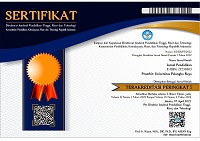The Increasing of Higher Order Thinking Skills by Problem Based Learning
DOI:
https://doi.org/10.52850/jpn.v23i2.5306Keywords:
HOTS, problem-based learning, conventional learning, Bloom's taxonomyAbstract
Higher Order Thinking Skills (HOTS) or higher order thinking skills are demands of today's curriculum. However, the facts at SMPN 2 Kapuas Tengah Satu Roof show that students at the school do not yet have this ability. This study is intended to describe the effect of problem-based learning on HOTS. His research uses a quantitative approach with a quasi-experimental type. The population is junior high school students in Kapuas Tengah District, Kapuas Regency. The samples were class VII A and VIII A (experimental class), and class VII B and VIII B (control class). The instruments are pre-test and post-test. Data were analyzed using N-gain and covariate analysis. The conclusion shows that the increase in HOTS from pre-test to post-test as measured using N-gain in students who learn with problem-based lea[1]rning is better than those who learn using conventional learning. Problem-based learning has an effect on HOTS which is indicated by the HOTS of students in problem-based learning classes more than students in conventional learning classes.
Downloads
References
Anggoro, R. P. 2019. Pengaruh Model Pembelajaran Kooperatif Berbasis HOTS terhadap Kemampuan Berpikir Matematis. AdMathEdu, 9(2),135-144.
Arends, R.I., & Killcher, A. 2010. Teaching For Student Learning: Becoming An Accomplished Teacher. New York, NY: Routledge. (Arends & Killcher, 2010).
Aziz, Z., & Hossain, A. 2010. A Comparison of Cooperative Learning and Conventional Teaching on Student Achievement in Secondary Mathematics. Procedia – Social and Behavioral Sciences, 9, 53-62.
Erdogan, F. 2019. Effect of Cooperative Learning Supported by Reflective Thinking Activities on Students’ Critical Thinking Skills. Eurasian Journal of Educational Research, 19(80), 89-112.
Flamboyant, F.U., Murdani, E., & Soeharto. 2018. Pengaruh Model Problem Based Learning terhadap Higher Order Thinking Skills Peserta Didik SMA Negeri di Kota Singkawang pada Materi Hukum Archimedes. Variabel, 1(2), 51-59.
Ghufron, A., & Sutama. 2011. Evaluasi Pembelajaran Matematika. Jakarta: UT Press.
Gokkurt, B., Dundar, S., Soylu, Y., & Akgun, L. 2012. The Effects of Learning Together Technique Which is based on Cooperative Learning on Student’ Achieevement in Mathematics Class. Procedia – Social and Behavioral Sciences, 46, 3431-3434.
Hobri, et. al. 2020. The Effect of Jumping Task Based on Creative Problem Solving on Students’ Problem Solving Ability. International Journal of Instruction, 13(1), 387-406.
Komariah, N., Mujasam, Yusuf, I., & Widyaningsih, S. W. 2019. Pengaruh Penerapan Model PBL Berbantuan Media Google-Classroom terhadap HOTS, Motivasi dan Minat Peserta Didik. Silampari Jurnal Pendidikan Ilmu Fisika, 1(2), 102-114.
Kusumawardani, N., N., Rusijono, Dewi, U. 2022. Pengaruh Model Problem Based Learning terhadap Kemampuan Berpikir Kritis Matematis Siswa dalam Memecahkan Masalah Matematika. Jurnal Ilmiah Mandala Education, 8(2), 1416-1427.
Lestari, E., Cahyono, H., & Awaluddin. (2019). Penerapan Model Pembelajaran Group Investigation pada Materi Lingkaran untuk meningkatkan Kemampuan Berpikir Kritis. Jurnal Math Educator Nusantara, 5(2), 124-139.
Mairing, J. P. 2018. Pemecahan Masalah matematika. Bandung : Alfabeta.
Maskur, et. al. 2020. The Effectiveness of Problem Based Learning and Aptitude Treatment Interaction in Improving Mathematical Creative Thinking Skills on Curriculum 2013. European Journal of Education Research, 9(1), 375-383.
Mulyanto, H., Gunarhadi, & Indriayu, M. 2018. The Effect of Problem Based Learning Model on Student Mathematics Learning Outcomes Viewed from Critical Thinking Skills. International Journal of Educational Research Review, 3(2), 37-45.
Permatasi, L. 2020. Improving the Ability to Solve Mathematical Problems based on Higher Order Thinking Skill (HOTS) through Team Assisted Individualization (TAI). Jurnal Hipotenusa, (2)1. 6-11.
Rizqi, M., Suyitno, H., & Dwijanto. 2021. Efektivitas Pembelajaran Berbasis Masalah dalam Meningkatkan Kemampuan Berpikir Kreatif Matematis Siswa MTS Islamic Center Cirebon. KoPeN: Konferensi Pendidikan Nasional, 3(1), 300-305.
Setianingsih, Yuniarsih, & Rozali 2018. Pengaruh Model pembelajaran Kooperatif Tipe Teams games Tournament terhadap Kemampuan Berpikir Tingkat Tinggi Siswa.
Siregar, N. F. (2019). Pengaruh Model Problem Based Learning terhadap Higher Order Thinking Skills Siswa SMP. Eksakta, 7(1), 14-23.
Slameto. 2018. Penerapan Cooperative Learning Untuk Meningkatkan HOTS. Jurnal Pendidikan Dasar PerKhasa, 4(1). 124-140.
Tuah, & Rahmi, S.Y. 2020. Pengaruh Pembelajaran Kooperatif Tipe Student Team Achievement Divisions terhadap Higher Order Thinking Skills Siswa. Al-Khawarizmi: Jurnal Pendidikan Matematika, 1(2), 23-27.
Wahyuli, E. B. 2011. Penerapan Model Pembelajaran Kooperatif Tipe STAD Untuk Meningkatkan Pemahaman Konsep Matematika Pada Materi Persamaan dan Pertidaksamaan Kuadrat Pada Peserta Didik Kelas X TKJ di SMK 45 Wonosari, FMIPA UNY jurusan Matematika.
Wulandari, N. A. D. 2022. Peningkatan Kemampuan Pemecahan Masalah Matematika Materi Lingkaran menggunakan Model Pembelajaran Berbasis Masalah Kelas VIII SMP Negeri 2 Tlogomulyo Tahun Pelajaran 2020/2021. Educatif : Journal of Education Research, 4(2), 8-15.
Downloads
Published
How to Cite
Issue
Section
License
Copyright (c) 2022 Ervina, Jackson Pasini Mairing, Yumiati

This work is licensed under a Creative Commons Attribution-NonCommercial-NoDerivatives 4.0 International License.















